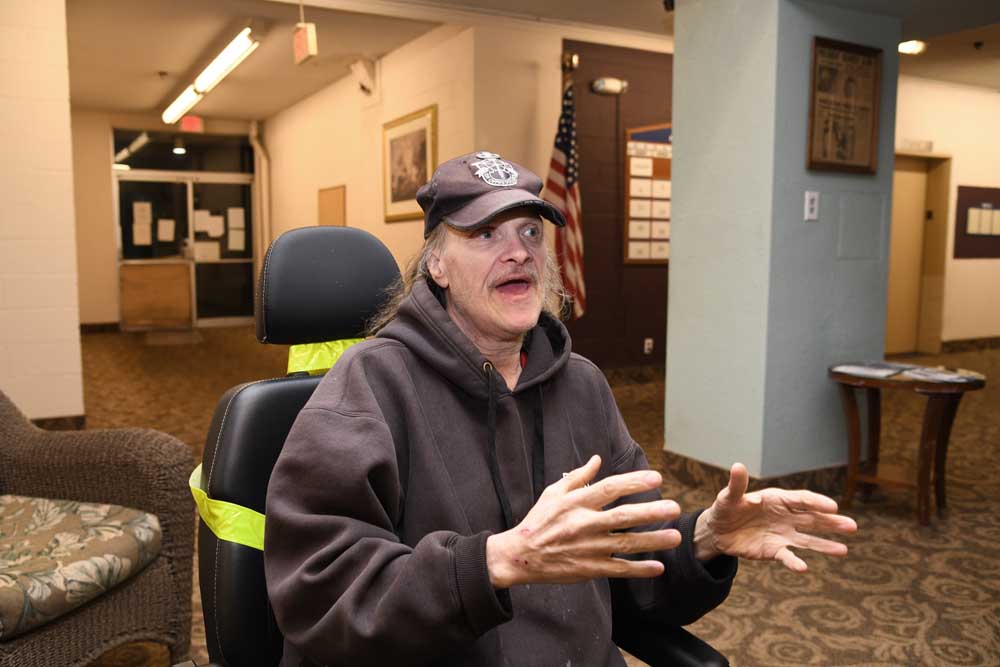Most Forest Glen tenants have few options if Canyonville evictions occur
Published 9:46 am Wednesday, February 28, 2024

- Army veteran Michael Liston said homeless people often break into the lobby of Forest Glen Senior Residence at night and cause issues for residents. The dilapidated building is home to four dozen low-income senior and elderly residents. A notice of closure was issued Feb. 9, but official eviction procedures have not been initiated.
CANYONVILLE — Sitting in the well-worn seat of his electric scooter on Thursday evening in the lobby of the Forest Glen Senior Residence, 63-year-old Michael Liston said he’s not rattled by much.
Trending
A former Green Beret wearing a black U.S. Army Special Forces hat, Liston said he is facing a slew of medical issues, including a severely infected foot.
On Feb. 9, he became one of four dozen residents who learned the building they live in had been closed “effective immediately.”
Liston said the closure — announced in a letter but without eviction notices, which have yet to be issued — came on top of the everyday uncertainty and chaos of life in the old, dilapidated structure.
Trending
A familiar six-story building along a frontage road adjacent to Interstate 5, Forest Glen has been operated by an entity called Harmony Active Living LLC for most of the past year. The letter said the building was closed due to financial struggles of the building owner, Emmert LLC, though residents have yet to leave.
The same letter laid off more than a dozen employees who help with building maintenance and meal service, though most continued to work — unpaid — helping residents who rely on them.
While the building is run as an apartment complex, with meal service offered as an amenity since rooms don’t have kitchens, many residents are high-needs and rely on help from their community and good samaritans to get by. Some struggle to get medications picked up, or need reminders to take them. Some would not be able to leave the facility without assistance.
Before living at Forest Glen for the past six years, Liston, like many of his neighbors, was homeless for “quite a few years,” he said.
Liston, still in his scooter, placed a Styrofoam container of dining room leftovers on the mantel of an electric fireplace and surveyed the lobby, which had drywall patches, yellowed ceilings and flickering lights. The building’s cooling and heating systems work intermittently at best. A major plumbing leak affects water pressure. Glass lobby doors have been broken and are boarded up with scraps of cardboard and plywood.
A fellow tenant snored from a faded upholstered chair nearby.
“He sleeps down here to watch the doors since you really can’t lock them,” Liston explained.
“We get homeless who come in. If they’re in a taking mood, they take stuff. … They try to get into some of the rooms that are being worked on. That’s one of the reasons we try to make everybody sign in, but also because, if there’s an emergency, how will we get everyone out?”
In a span of minutes, at least two residents wandered through the lobby to play with elevator buttons despite a scolding from Liston.
Nodding at one of the saboteurs, Liston said the man often urinates near building entryways and common spaces and spends his time playing with the already failing elevator.
“Quit pushing the damn buttons!” Liston yelled, noting that the man once lived on the second floor, which was run as a residential care facility for tenants who needed supervised care.
That facility was closed last May after a long list of violations, ranging from residents given the wrong medication to staff failing to keep residents safe, reported to state officials.
“He pushes every damn button. He really needed to be on (floor) 2 because he was restricted on stuff he could do, but they cut him loose when they shut that down. Now he’s just on (floor) 5, causin’ problems. Residents can tolerate him. Sometimes he gets physical, but he knows better with some of us,” Liston said.
While the building is in a state of disrepair and management is limited in what it can do with problem residents, Liston said the building is the only stability many of the residents can afford. There is camaraderie among some of them — residents make soda runs for each other, share rides to do errands, and cook on hotplates in their rooms and share leftovers — and constant squabbling among others.
“I feel bad for some of these people. I have some help, some options … most of the others don’t,” he added.
“I have someplace I could go, but I’ll stay here and fight with them until they pull us out.”
Liston said building repairs, better management and security would improve living conditions.
On Thursday, a meeting took place at Forest Glen, where dozens of tenants and former employees gathered — along with representatives of state and county agencies, state legislators and more than 130 community members — to discuss the fate of the building and those who have lived and worked there.
Afterward, most residents returned to their rooms. One man picked fights with a few of his neighbors, prompting a call to police.
Rain Clark, a former Harmony Active Living manager who lives in the building, was getting out of a bath when she heard screaming. Clark was on her way to check on residents when she ran into former assistant manager Star Netherton, who was on the phone with a 911 dispatcher, on the third floor.
Clark had been in the process of evicting the culprit when she and her coworkers all got fired, she said.
“Now I have no authority, no leg to stand on to deal with a lot of things going on,” she said.
The closure announcement, and being laid off, had complicated the already difficult job of managing an old building that houses a vulnerable population. Clark has yet to hear from building owner Terry Emmert, not even about an eviction timeline, she said.
“If the building closes, I would say 90% of us living here would be homeless or worse,” she said.
“We still have not received any move-out notice. However, since the community meeting, things have started to calm, though we are still having to assure some residents that we are still OK.”
James Avery, an Army veteran and resident of the third floor who came out of his room during the evening’s disturbance, worried for his neighbors. Avery moved into the building just over a year ago and said the pros outweigh the cons.
“As far as just for it being an apartment, I love it here. I think it’s great. The price is right. The building is run down, sure. There’s lead pipes and asbestos. But it’s a solid shell of a building,” Avery said.
“Before here, I lived in my truck. … When COVID hit, I was living in West Seattle and I didn’t know what was coming. I figured, ‘I’m just gonna go camping.’ Eventually, I went into the VA, they showed me this place, so I checked it out. I have cancer, so it’s somewhere to be.”
The letter announcing the closure, Avery said, was as concerning as the lack of direction that followed.
“If they really do close it, I worry about the people who can’t really take care of themselves financially — or mentally,” Avery said.
“Some of these people need a lot more than just a room.”
A standing-room-only crowd of 130-plus community members and tenants of Forest Glen Senior Residence attended a Thursday meeting that yielded more questions than answers.
Notice of the building’s closure — and the laying off of employees who maintained the building and prepared meals — was issued Feb. 9. Residents have not received eviction notices, and several former employees have stayed on voluntarily to cook and maintain the building.
Community members have donated supplies and helped with repairs and cleaning. Oregon Department of Human Services has formed a Community Action Workgroup to assist tenants. The group includes liaisons from ODHS, the state Office of Aging and People with Disabilities, state Public Health Division, local emergency management, the Umpqua Community Action Network, Cow Creek Band of Umpqua Tribe of Indians, and other partners.
The Cow Creek Tribe, which operates the nearby casino, pledged to provide garbage service after trash service discontinued for non-payment. Canyonville city officials vowed to continue water service despite an account balance “in the thousands” and five months past due.
The building is owned by Terry Emmert, who purchased the building for about $700,000 in 2022. Emmert’s friend, structural engineer Jerry Reeves, founded Harmony Living LLC and said he agreed to act as Emmert’s agent in running the building. ODHS officials say Emmert told the agency he has no authority to evict tenants.
The building is considered an apartment complex — not a licensed facility — though a facility was operated on the second floor until it closed last May. Reeves said Monday he has not heard from Emmert since the closure was announced. Emmert, who reportedly listed the building for sale in April for $8.1 million, did not return calls by the Rogue Valley Times.
State Rep. Christine Goodwin, R-Canyonville, said Monday she had urged state leaders to get involved. Goodwin voiced concern about the condition of the building and lack of alternatives for residents.
“For the short term, these people are safe, they are fed, they are warm, and they are dry in their rooms,” she said.
“Eventually, some of them may have to accept they will have to find other facilities. … Some people are very fearful of leaving what they know, but we know the situation cannot continue as-is. These residents are going to have to transition … The building is not OK.”









